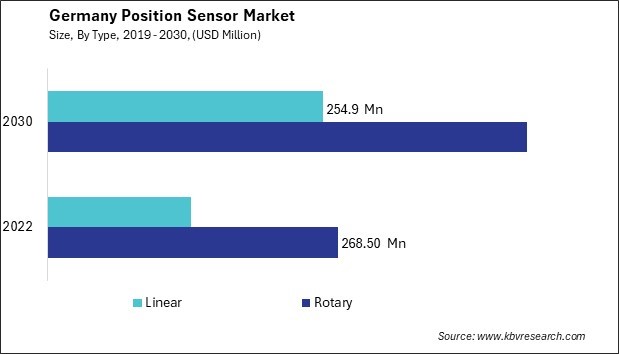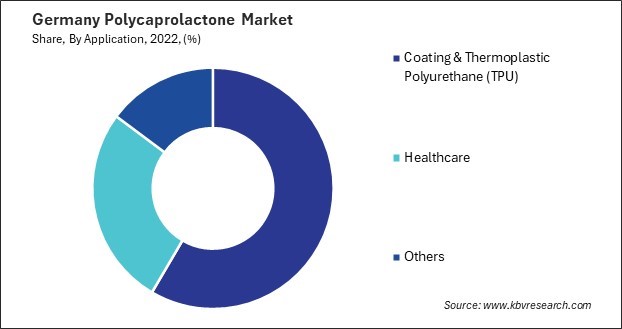Int'l : +1(646) 832-2886 | query@kbvresearch.com
Int'l : +1(646) 832-2886 | query@kbvresearch.com
Published Date : 16-May-2024 |
Pages: 108 |
Formats: PDF |
The Germany Position Sensor Market size is expected to reach $698.1 Million by 2030, rising at a market growth of 7.3% CAGR during the forecast period. In the year 2022, the market attained a volume of 1310.3 Thousand Units, experiencing a growth of 9.6% (2019-2022).
The position sensor market in Germany has witnessed significant growth in recent years, driven by the country's thriving industrial sector and a strong emphasis on technological advancements. The automotive industry is one of the key drivers of the position sensor market in Germany. As a global automotive hub, Germany hosts some of the world's leading automobile manufacturers and suppliers. Position sensors find extensive applications in vehicles for tasks such as throttle position sensing, pedal position sensing, and gearbox position monitoring. With the automotive industry in Germany consistently pushing the boundaries of innovation, the demand for high-precision and reliable position sensors has surged.

According to Germany Trade & Invest, German automobile manufacturers produced over 15.6 million vehicles in 2021. As the automotive landscape in Germany continues to embrace cutting-edge solutions, the position sensor market is poised to be a key player in shaping the future of the country's automotive industry.
The COVID-19 pandemic has had a significant impact on the position sensor market in Germany, as it disrupted supply chains, temporarily halted production activities, and led to a decline in demand across several industries. However, the pandemic also accelerated the adoption of automation and robotics in various sectors as companies sought to minimize human contact and ensure business continuity amid lockdowns and social distancing measures. This increased emphasis on automation is expected to drive the demand for position sensors in the post-pandemic recovery phase.
Germany, a technological powerhouse, is witnessing a significant surge in the adoption of IoT technologies, particularly in position sensors. One key driver behind the increasing adoption of IoT-enabled position sensors in Germany is the country's commitment to Industry 4.0. Germany has been at the forefront of the fourth industrial revolution, emphasizing integrating digital technologies into manufacturing processes. Position sensors, equipped with IoT capabilities, are integral to the vision of smart factories, enabling precise tracking of assets, optimizing workflows, and enhancing overall operational efficiency.
Moreover, the healthcare industry in Germany is leveraging IoT-enabled position sensors for various applications, including asset tracking in hospitals, monitoring patient movements, and ensuring medical equipment safety. Integrating these sensors contributes to the efficiency of healthcare services, ultimately improving patient care and streamlining hospital operations.
According to the International Trade Administration, Germany's healthcare sector generates an economic footprint of EUR 775 billion, or roughly 12 % of Germany's GDP. In 2022, the gross value added to the healthcare industry was EUR 439.6 billion. This corresponds to 12.7 % of the gross value added of the overall German economy. As Germany continues to prioritize advancements in healthcare, it has also witnessed a parallel growth in associated technologies. The position sensor market in Germany, a vital component in various medical devices and diagnostic equipment, is positioned to benefit from this upward trajectory, contributing further to the nation's technological and economic landscape.
In the automotive sector, a cornerstone of the German economy, IoT-enabled position sensors are instrumental in developing autonomous vehicles. As Germany continues to be a global leader in automotive innovation, the demand for advanced position sensors incorporating IoT technologies is experiencing a notable upswing. Thus, Germany's robust commitment to Industry 4.0 drives a surge in IoT-enabled position sensor adoption, revolutionizing manufacturing processes and bolstering the country's technological leadership.
Germany's aerospace and defense sector has witnessed a significant expansion, propelling the demand for position sensors in recent years. The German aerospace industry has experienced robust growth fueled by government initiatives, research and development investments, and collaborations between industry and academia. This growth has translated into an increased focus on improving the precision and efficiency of aircraft and defense systems, making position sensors a critical component in ensuring optimal performance.
The aerospace industry in Germany, comprising renowned companies such as Airbus and DLR (German Aerospace Center), has increasingly adopted position sensors to enhance navigation, guidance, and control systems in aircraft. These sensors contribute to the safety and reliability of flight operations, ensuring precise positioning and motion tracking. Moreover, in defense applications, Germany's military forces utilize position sensors in various platforms, including ground vehicles and naval vessels, to bolster situational awareness and improve overall operational effectiveness.
According to the International Trade Administration, in 2019, the German aerospace industry experienced a notable uptick in revenues, reaching EUR 41 billion and reflecting a growth rate of 2.5% compared to the previous year's EUR 40 billion. This marked a substantial progression from the beginning of the decade when annual revenues stood just above EUR 25 billion. Germany has the third-largest aerospace and defense industry, with revenues hitting EUR 39 billion in 2022.
Germany's aerospace and defense industry is actively engaging in the position sensor market, leveraging cutting-edge technologies to enhance navigation systems, improve precision, and contribute to the overall efficiency of aerospace applications. This strategic move positions Germany as a key player in the evolving landscape of aerospace technology, fostering economic growth and technological leadership.
Collaborations between German aerospace and defense companies and sensor manufacturers have become increasingly prevalent, fostering a synergistic environment for technological advancements. Therefore, Germany's aerospace and defense sector's remarkable expansion has led to a growing demand for position sensors, with prominent industry players like Airbus and DLR embracing these technologies to enhance navigation and control systems.

The position sensor market in Germany is characterized by a diverse range of companies contributing to the country's technological landscape. One prominent player in the German position sensor market is Infineon Technologies AG. Headquartered in Munich, Infineon is a global semiconductor manufacturing company that produces sensors, including position sensors. Their advanced sensor technologies find applications in automotive systems, enabling precise control and monitoring of vehicle functions. Infineon's commitment to innovation and quality has solidified its position as a key player in Germany's position sensor market.
IFM Electronic GmbH, is a German company that excels in providing automation technology and sensor systems. With a focus on position sensing solutions, IFM Electronic's products are integral in optimizing manufacturing processes. The company's sensors contribute to increased productivity, reliability, and efficiency, aligning with Germany's reputation for precision engineering and industrial excellence.
Another notable participant is Sick AG, a sensor intelligence company headquartered in Waldkirch. Sick specializes in manufacturing sensors and sensor solutions for industrial applications. In position sensors, the brand offers a wide range of products catering to diverse industries such as logistics, manufacturing, and process automation. The company's sensors contribute to improved efficiency and automation in various processes, aligning with Germany's emphasis on technological advancement in industrial sectors.
In the field of magnetic position sensors, Sensitec GmbH stands out as a leading German company. Specializing in magneto resistive sensor technology, Sensitec provides high-precision position sensors for automotive, industrial, and medical applications. The company's innovative sensor solutions contribute to developing cutting-edge technologies, reflecting Germany's position as a hub for technological innovation. These companies are crucial in driving innovation, efficiency, and precision across various industries, reinforcing Germany's position as a global leader in sensor technology and industrial automation.
By Type
By Contact Type
By Output
By Application
By Vertical